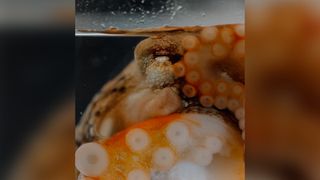
For octopuses, changing color burns about as many calories as a human on a 30 minute jog pound for pound, new research suggests.
Octopuses are masters of disguise, changing color at the drop of a hat to startle predators and hide from prey. But the energetic cost of this shade shifting has remained a mystery.
Now, for the first time, biologists have measured how much energy these animals actually use for their total tonal transformations. The finding can tell scientists more about these animals' biology.
"All animal adaptation come[s] with both benefits and costs," study senior author Kirt Onthank, a marine biologist and biology professor at Walla Walla University in Washington, told Live Science. "We know a lot about the benefits of the octopus color change system, but until now we have known virtually nothing about the costs. By knowing the costs of color change to the octopus, we have a better understanding of what types of trade-offs octopuses are making in order to stay hidden."
Like many other cephalopods, octopuses have a special set of small organs in their skin called chromatophores.
Related: How do octopuses change color?
"Each chromatophore is a small, stretchy sac of pigment that has rays of muscles attached to it like spokes of a wheel attached to the hub," Onthank said. "When the muscle[s] are relaxed, the sac of pigment is collapsed to a small point that is generally too small to see. When the muscle[s] contract, they stretch this sac of pigment out over a small patch of skin, and the color inside can be seen."
Each of these chromatophores is like a tiny pixel on a screen. "Octopuses have 230 chromatophores per square millimeter on their skin," Onthank said. "To put this into context, a 4K 13-inch laptop monitor has about 180 pixels per square millimeter."
To change color, thousands of tiny muscles in these pixel-like organs contract. "By controlling each of these chromatophores with their nervous system, they [octopuses] can create very elaborate and impressive camouflage or displays," Onthank said.
In the new study, published Nov. 18 in the journal PNAS, Onthank and first author Sofie Sonner, who conducted the research as part of her master's thesis at Walla Walla University in Washington state, collected skin samples from 17 ruby octopuses (Octopus rubescens) and measured oxygen consumption during chromatophore expansion and contraction. They then compared this to each octopus's resting metabolic rate.
The average octopus used about 219 micromoles of oxygen per hour to fully change color—roughly the same amount of energy they use to carry out all other bodily functions when at rest, the study found.
By scaling up their calculations to match human surface area, Onthank said that, if our species had color-changing octopus skin, we would burn roughly 390 extra calories a day changing color — about the same as completing a 23-minute run.
Octopuses and cephalopods aren't the only animals that can change color. "Rapid color change has evolved independently multiple times across a diverse array of animal taxa, including in amphibians, reptiles, fish, arthropods, and mollusks, which shows its widespread adaptive significance," Sonner told Live Science.
However, cephalopods' color transformations are much quicker and more precise. "Most other animals that can rapidly change color, like chameleons, use hormones to control the system and pigments inside cell[s]," Onthank said. Those methods are slower but probably also use less energy, he added.
The researchers hope to use their system to measure energy expenditure in other cephalopod species, as well as deep sea octopuses, to better understand these energetic trade-offs and, in turn, to gain new insights into octopus biology.


评论(0)